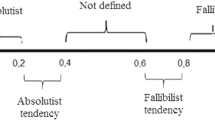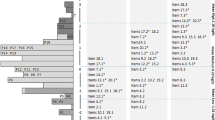Abstract
In this article results from an examination of beliefs about teaching and learning primary mathematics are reported. Commencing and graduating pre-service teachers completed written surveys and interviews. Common to many preservice teachers were memories of mathematics lessons with teacher demonstrations, completing set exercises, using mathematical equipment, and playing competitive number-based games. Various factors influenced their beliefs including: having theory linked to practical examples, reflecting on more recent experience of teaching and learning contexts, and listening to experiences shared by friends and family members who teach.
Similar content being viewed by others
References
Ambrose, R., Clement, L., Philipp, R., & Chauvot, J. (2004). Assessing prospective elementary school teachers’ beliefs about mathematics and mathematics learning: Rationale and development of a constructed-response-format beliefs survey.School Science and Mathematics, 104(2), 56–70.
Beswick, K. (2003). Accounting for the contextual nature of teachers’ beliefs in considering their relationship to practice. In L. Bragg, C. Campbell, G. Herbert, & J. Mousley (Eds.),Mathematics education research: Innovation, networking, opportunity (Proceedings of the 26th annual conference of the Mathematics Education Research Group of Australasia, Vol. 1, pp. 152–159). Sydney: MERGA.
Block, J., & Hazelip, K. (1995). Teachers’ beliefs and belief systems. In L. Anderson (Ed.),International encyclopedia of teaching and teacher education (2nd ed.) (pp. 25–28). Oxford, UK: Elsevier Science Ltd.
Calderhead, J., & Robson, M. (1991). Images of teaching: Student teachers’ early conceptions of classroom practice.Teaching and Teacher Education, 7(1), 1–8.
Carter, K., & Doyle, W. (1996). Personal narrative and life history in learning to teach. In J. Sikula, T. Buttery, & E. Guyton (Eds.),Handbook of research on teacher education (2nd ed.) (pp. 120–142). New York: Simon and Schuster Macmillan.
Gorard, S. (2001).Quantitative methods in educational research. London: Continuum.
Hart, L. (2002). Preservice teachers’ beliefs and practice after participating in an integrated content/methods course.School Science and Mathematics, 102(1), 4–15.
Hatch, A. (1999). What preservice teachers can learn from studies of teachers’ work.Teaching and Teacher Education, 15, 229–242.
Kagan, D. (1992). Implications of research on teacher belief.Educational Psychologist, 27(1), 65–90.
Kaminski, E. (2003). Promoting preservice teacher education students’ reflective practice in mathematics.Asia-Pacific Journal of Teacher Education, 31(1), 21–32.
Kardash, C., & Scholes, R. (1996). Effects of pre-existing beliefs, epistemological beliefs, and the need for cognition on the interpretation of controversial issues.Journal of Educational Psychology, 88(2), 260–271.
Munby, H., Russell, T., & Martin, A. (2001). Teachers’ knowledge and how it develops. In V. Richardson (Ed.),Handbook of research on teaching (4th ed.) (pp. 877–904). Washington, DC: American Educational Research Association.
Nespor, J. (1987). The role of beliefs in the practice of teaching.Journal of Curriculum Studies, 19(4), 317–328.
Pajares, F. (1992). Teachers’ beliefs and educational research: Cleaning up a messy construct.Review of Educational Research, 62(3), 307–332.
Putnam, R., & Borko, H. (2000). What do new views of knowledge and thinking have to say about research on teacher learning?Educational Researcher, 29(1), 4–15.
Richards, T., Richards, L., Fraser, D., & Barrington, T. (2000).NVivo: NUD*IST for qualitative research (Version 1.2) [CD-ROM]. La Trobe University: QSR International Pty Ltd.
Richardson, V. (1996). The role of attitudes and beliefs in learning to teach. In J. Sikula, T. Buttery, & E. Guyton (Eds.),Handbook of research on teacher education (2nd ed.) (pp. 102–119). New York: Simon & Schuster Macmillan.
Sarver, V. (1983). Ajzen’s and Fishbein’s “theory of reasoned action”: A critical assessment.Journal for the Theory of Social Behaviour, 13(2), 155–163.
Scott, A. (2003). Links between beliefs of pre-service teachers about literacy and numeracy learning. In L. Bragg, C. Campbell, G. Herbert, & J. Mousley (Eds.),Mathematics education research: Innovation, networking, opportunity (Proceedings of the 26th annual conference of the Mathematics Education Research Group of Australasia, Vol. 1, pp. 152–159). Sydney: MERGA.
Smith, K., & Croom, L. (2000). Multidimensional self-concepts of children and teacher beliefs about developmentally appropriate practices.The Journal of Educational Research, 93(5), 312–322.
Stipek, D., Givvin, K., Salmon, J., & MacGyvers, V. (2001). Teachers’ beliefs and practices related to mathematics instruction.Teaching and Teacher Education, 17, 213–226.
Stuart, C., & Thurlow, D. (2000). Making it to their own: Preservice teachers’ experiences, beliefs, and classroom practices.Journal of Teacher Education, 51(2), 113–124.
Sullivan, P. (1993). Short flexible mathematics games. In J. Mousley & M. Rice (Eds.),Mathematics: Of primary importance (pp. 211–217). Melbourne: Mathematical Association of Victoria.
Weinstein, C. (1989). Teacher education students’ preconceptions of teaching.Journal of Teacher Education, 40(2), 53–60.
Wiersma, W. (1995).Research methods in education (6th ed.). Massachusetts: Allyn and Bacon.
Wilkins, J., & Brand, B. (2004). Change in preservice teachers’ beliefs: An evaluation of the mathematics methods course.School Science and Mathematics, 104(5), 226–233.
Author information
Authors and Affiliations
Rights and permissions
About this article
Cite this article
Scott, A.L. Pre-service teachers’ experiences and the influences on their intentions for teaching primary school mathematics. Math Ed Res J 17, 62–90 (2005). https://doi.org/10.1007/BF03217422
Issue Date:
DOI: https://doi.org/10.1007/BF03217422




